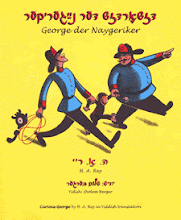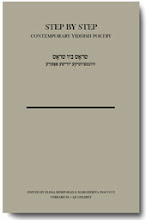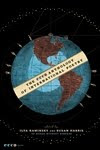Meanwhile. . .
People are still dying in Darfur.
5/30/05
The Bridge
Anna Margolin
(from Yiddish: Z.Sh.B.)
The Williamsburg Bridge naps
in the heavy gold of the day.
The city's wild heart
is breathing quick and weary.
In the day's heavy gold
the ferry's a blue cord.
Feverish and sharp
the accompaniment of the cars.
The heavy gold of the day
is brilliant, between iron ropes
nets cast out
to capture happiness.
But I don't want happiness.
I want my pain and secret.
I am a golden bridge
over the steel city.
Anna Margolin
(from Yiddish: Z.Sh.B.)
The Williamsburg Bridge naps
in the heavy gold of the day.
The city's wild heart
is breathing quick and weary.
In the day's heavy gold
the ferry's a blue cord.
Feverish and sharp
the accompaniment of the cars.
The heavy gold of the day
is brilliant, between iron ropes
nets cast out
to capture happiness.
But I don't want happiness.
I want my pain and secret.
I am a golden bridge
over the steel city.
Labels:
poetry,
translation,
Yiddish literature
5/12/05
Public and Private
And sick and well.
Medicine Mensch 5 is below. Enjoy!
MEDICINE MENSCH: A Tale of Two Hospitals
By Zackary Sholem Berger
May 13, 2005
Fancy Private Hospital is conveniently located in Upper Manhattan, a few blocks away from a subway stop. If you like, though, you can stroll to the main building along Madison Avenue, perhaps stopping at some of the boutiques you'll find along the way. A few other students and I took such a relaxed trip to FPH for a recent rotation. On our first day we went to a well-appointed office in an embassylike building of white stone, with an interior decorated in brass and wood. We settled into plush chairs and waited for the administrator. When she arrived, she gave us all a big smile as she handed out our orientation packets. "Welcome to Fancy!" she said. She gave us each a sheaf of meal tickets ("Hold on to these. They're just like money!") and told us where the swimming pool was.
Needless to say, we all had had somewhat different formative experiences in Raucous Urban Hospital, another one of the health care facilities operated by my university. There you're not so much welcomed as acknowledged. The elevators don't work, efficiency is not rampant and budgets are tight — but all this has come to be expected by the people who work there. Otherwise, it wouldn't be raucous and probably wouldn't serve as much of the public.
Both Fancy and Raucous are teaching hospitals where medical students (not yet doctors) and residents (doctors at the beginning of their training) learn to perform procedures and make diagnoses on real patients — you and me and our relatives. Everyone would love to be treated by the expert in whatever malady she's currently suffering from, but there aren't enough experts to go around. So people are treated by teams, the long chains of white-coated big-and-little-fish the patient sees snaking into and out of the room. Although a couple of people in that big group are more responsible for what happens to the sick person, no single person carries out all of a given patient's care over the course of a month.
That is, once in a hospital, every sick person realizes that he or she is one of dozens treated by a team of interlocking personalities. The patients at Fancy Private and Raucous Urban deal with this realization in ways that are superficially different. Some at Fancy Private, used to the best in everything in other areas of their lives (or merely the upper-middle-class certainty that they will be properly accommodated — be it at the hairdresser's, their favorite boutique or their local restaurant), will insist that they be treated only by their personal physician or at least an attending physician — no residents for them. Little does the patient know that when the attending physician gets word of this request, she'll probably roll her eyes, pick up the phone and have a good laugh about it with one of the residents, the ones she relies on to carry out the day-to-day work of patient care in a hospital with hundreds upon hundreds of patients. The Raucous Urbanites, on the other hand, tend to address everyone on the team — from lowly medical student to seasoned attending physician — as "Doctor," and impute to each of them the same level of training and responsibility. According to strict accuracy and ethical practice, the medical student should remind his patient that he is not, after all, a doctor. But how many times can you remind someone of this, especially when it's eminently possible that the person doesn't want to be reminded?
Public and private patients have something very basic in common: the wish to know who's treating them and the illusion that they have detailed control over their daily care. Of course they have control over the general decisions relating to their medical treatment: Informed consent is one of the pillars of current medical practice. (How "informed" this consent really is, however, is another matter entirely.) But once the patient makes a decision about medical care, then the team takes over, general decisions are transmuted into professional jargon like liters of lactated Ringer's solution, and a view of the forest is lost as trees are thickly planted at the patient's bedside.
That's why I try to introduce myself to every patient and have something approaching a conversation so that the patients at least have some personal contact with someone on their team, even if it's only the most insignificant and least important member. The Raucous Urban patients get my best doctor imitation, while the Fancy Private patients, if necessary, get my solemn oath that I won't go near their bed. Both of these behaviors are not quite in good faith, but they make everyone involved feel better. Perhaps one day I'll have all the public patients up to Fancy Private for lunch so that I can use up my leftover meal tickets.
Zackary Sholem Berger is a medical student at both public and private hospitals, depending on his rotation. He is doing surgery now, but don't worry — he won't be operating on anyone anytime soon.
And sick and well.
Medicine Mensch 5 is below. Enjoy!
MEDICINE MENSCH: A Tale of Two Hospitals
By Zackary Sholem Berger
May 13, 2005
Fancy Private Hospital is conveniently located in Upper Manhattan, a few blocks away from a subway stop. If you like, though, you can stroll to the main building along Madison Avenue, perhaps stopping at some of the boutiques you'll find along the way. A few other students and I took such a relaxed trip to FPH for a recent rotation. On our first day we went to a well-appointed office in an embassylike building of white stone, with an interior decorated in brass and wood. We settled into plush chairs and waited for the administrator. When she arrived, she gave us all a big smile as she handed out our orientation packets. "Welcome to Fancy!" she said. She gave us each a sheaf of meal tickets ("Hold on to these. They're just like money!") and told us where the swimming pool was.
Needless to say, we all had had somewhat different formative experiences in Raucous Urban Hospital, another one of the health care facilities operated by my university. There you're not so much welcomed as acknowledged. The elevators don't work, efficiency is not rampant and budgets are tight — but all this has come to be expected by the people who work there. Otherwise, it wouldn't be raucous and probably wouldn't serve as much of the public.
Both Fancy and Raucous are teaching hospitals where medical students (not yet doctors) and residents (doctors at the beginning of their training) learn to perform procedures and make diagnoses on real patients — you and me and our relatives. Everyone would love to be treated by the expert in whatever malady she's currently suffering from, but there aren't enough experts to go around. So people are treated by teams, the long chains of white-coated big-and-little-fish the patient sees snaking into and out of the room. Although a couple of people in that big group are more responsible for what happens to the sick person, no single person carries out all of a given patient's care over the course of a month.
That is, once in a hospital, every sick person realizes that he or she is one of dozens treated by a team of interlocking personalities. The patients at Fancy Private and Raucous Urban deal with this realization in ways that are superficially different. Some at Fancy Private, used to the best in everything in other areas of their lives (or merely the upper-middle-class certainty that they will be properly accommodated — be it at the hairdresser's, their favorite boutique or their local restaurant), will insist that they be treated only by their personal physician or at least an attending physician — no residents for them. Little does the patient know that when the attending physician gets word of this request, she'll probably roll her eyes, pick up the phone and have a good laugh about it with one of the residents, the ones she relies on to carry out the day-to-day work of patient care in a hospital with hundreds upon hundreds of patients. The Raucous Urbanites, on the other hand, tend to address everyone on the team — from lowly medical student to seasoned attending physician — as "Doctor," and impute to each of them the same level of training and responsibility. According to strict accuracy and ethical practice, the medical student should remind his patient that he is not, after all, a doctor. But how many times can you remind someone of this, especially when it's eminently possible that the person doesn't want to be reminded?
Public and private patients have something very basic in common: the wish to know who's treating them and the illusion that they have detailed control over their daily care. Of course they have control over the general decisions relating to their medical treatment: Informed consent is one of the pillars of current medical practice. (How "informed" this consent really is, however, is another matter entirely.) But once the patient makes a decision about medical care, then the team takes over, general decisions are transmuted into professional jargon like liters of lactated Ringer's solution, and a view of the forest is lost as trees are thickly planted at the patient's bedside.
That's why I try to introduce myself to every patient and have something approaching a conversation so that the patients at least have some personal contact with someone on their team, even if it's only the most insignificant and least important member. The Raucous Urban patients get my best doctor imitation, while the Fancy Private patients, if necessary, get my solemn oath that I won't go near their bed. Both of these behaviors are not quite in good faith, but they make everyone involved feel better. Perhaps one day I'll have all the public patients up to Fancy Private for lunch so that I can use up my leftover meal tickets.
Zackary Sholem Berger is a medical student at both public and private hospitals, depending on his rotation. He is doing surgery now, but don't worry — he won't be operating on anyone anytime soon.
5/11/05
Helping a Chadian defender of human rights
A friend writes:
Many have been active in various efforts to call attention to atrocities in Sudan and Darfur. I'm writing to introduce you to a human rights defender from that region, and to ask for your assistance in helping with his medical needs.
I work at Human Rights Watch, where I currently have the great fortune of sitting in the office next to one of the most extraordinary people I've ever met, Souleymane Guengueng, a Chadian human rights activist who worksclosely with several colleagues. He's an amazing, kind, warm and brave man, who is in the U.S. now for medical treatment for injuries suffere dafter being unjustly imprisoned and tortured in the 1980s. My office has raised most of the money for his treatment, but needs to raise some more.I'm writing to share this appeal for funds -- please share it with others, as appropriate.
Reed Brody, the attorney who has been working with Souleymane, sent me the appeal below. If you're interested in learning more about Souleymane, see these articles.
Please contact Reed Brody, brodyr@hrw.org, for further information.
From Reed Brody: Request
We are seeking to raise the last $10,000 needed for medical treatment forSouleymane Guengueng, one of our 2002 Human Rights Watch Monitors (total $40,000).
Souleymane Guengueng
Souleymane is the founder and Vice-President of the Chadian Association ofVictims of Political Repression and Crime (AVCRP), and is the main force behind the landmark effort to prosecute Chad’s former dictator Hissène Habré. As the New York Times said in its moving portrait of Souleymane, "on acontinent where ordinary men are tortured, killed and forgotten without asecond thought, Mr. Guengueng has done something extraordinary: fought back. After being unjustly imprisoned and tortured for two years in the late 1980's, he spent the next decade gathering testimony from fellow victims and their families. The evidence provided critical material forChadian and international human rights organizations to pursue a case against the country's former dictator, Hissene Habre."
France’s Liberation remarked that “a surprising tug of war pits this modest civil servant against the ex-dictator who bathed his country in blood.” Souleymane, falsely accused of supporting Habré’s opposition, lost much of his eyesight and almost died of dengue fever during two years of mistreatment in Habré's prisons, and watched hundreds of others succumb tomalaria, exhaustion, malnutrition and torture. When Habré fell, Souleymane and other former prisoners founded the AVCRP and gathered testimony from 792 victims, widows and orphans, hoping to use them to bring Habré to justice. When the new government recycled many of Habré's accomplices, however, Souleymane hid the files underneath the mud-brick home where he lives with the 24 members of his family, including nine children. That is where the files stayed for eight years until Souleymane handed them to a Human Rights Watch researcher in 1999. Since then, Souleymane has been the driving force behind this case. He has devoted all of his free time to the case – indeed his life is devoted to the case. He was recently fired from his civil service job because of this work.
Suleymane’s medical condition
When we brought Suleymane to the United States in late 2002 for the Human Rights Watch dinners, we were also able to get him two very successful eye operations and Souleymane can now see like a normal person. Thanks to our friends at the Bellevue/NYU Program for Survivors of Torture, we were able to have the operations done extremely cheaply.The bad news is that he was diagnosed with Hepatitis C, probably the result of a transfusion years back. The good news is that he has the strain that has an 80% chance of responding to a 6 month course of interferon treatment, which is what the doctors have strongly urged him to do to prevent potentially serious liver damage.
Souleymane Guengueng has become beloved to the staff of Human Rights Watch,and we have brought him back to carry out the difficult and debilitating interferon treatment. He has responded well to the first months of medication, though he had developed anemia, for which the doctors have prescribed additional medication.The total estimated budget is $39,860, or which we have already secured $29,000.
Checks should be made out to Human Rights Watch -- memo line "Souleymane Guengueng" -- and sent to Reed Brody, Human Rights Watch, 350 Fifth Avenue 34th Floor, NY, NY 10118.
A friend writes:
Many have been active in various efforts to call attention to atrocities in Sudan and Darfur. I'm writing to introduce you to a human rights defender from that region, and to ask for your assistance in helping with his medical needs.
I work at Human Rights Watch, where I currently have the great fortune of sitting in the office next to one of the most extraordinary people I've ever met, Souleymane Guengueng, a Chadian human rights activist who worksclosely with several colleagues. He's an amazing, kind, warm and brave man, who is in the U.S. now for medical treatment for injuries suffere dafter being unjustly imprisoned and tortured in the 1980s. My office has raised most of the money for his treatment, but needs to raise some more.I'm writing to share this appeal for funds -- please share it with others, as appropriate.
Reed Brody, the attorney who has been working with Souleymane, sent me the appeal below. If you're interested in learning more about Souleymane, see these articles.
Please contact Reed Brody, brodyr@hrw.org, for further information.
From Reed Brody: Request
We are seeking to raise the last $10,000 needed for medical treatment forSouleymane Guengueng, one of our 2002 Human Rights Watch Monitors (total $40,000).
Souleymane Guengueng
Souleymane is the founder and Vice-President of the Chadian Association ofVictims of Political Repression and Crime (AVCRP), and is the main force behind the landmark effort to prosecute Chad’s former dictator Hissène Habré. As the New York Times said in its moving portrait of Souleymane, "on acontinent where ordinary men are tortured, killed and forgotten without asecond thought, Mr. Guengueng has done something extraordinary: fought back. After being unjustly imprisoned and tortured for two years in the late 1980's, he spent the next decade gathering testimony from fellow victims and their families. The evidence provided critical material forChadian and international human rights organizations to pursue a case against the country's former dictator, Hissene Habre."
France’s Liberation remarked that “a surprising tug of war pits this modest civil servant against the ex-dictator who bathed his country in blood.” Souleymane, falsely accused of supporting Habré’s opposition, lost much of his eyesight and almost died of dengue fever during two years of mistreatment in Habré's prisons, and watched hundreds of others succumb tomalaria, exhaustion, malnutrition and torture. When Habré fell, Souleymane and other former prisoners founded the AVCRP and gathered testimony from 792 victims, widows and orphans, hoping to use them to bring Habré to justice. When the new government recycled many of Habré's accomplices, however, Souleymane hid the files underneath the mud-brick home where he lives with the 24 members of his family, including nine children. That is where the files stayed for eight years until Souleymane handed them to a Human Rights Watch researcher in 1999. Since then, Souleymane has been the driving force behind this case. He has devoted all of his free time to the case – indeed his life is devoted to the case. He was recently fired from his civil service job because of this work.
Suleymane’s medical condition
When we brought Suleymane to the United States in late 2002 for the Human Rights Watch dinners, we were also able to get him two very successful eye operations and Souleymane can now see like a normal person. Thanks to our friends at the Bellevue/NYU Program for Survivors of Torture, we were able to have the operations done extremely cheaply.The bad news is that he was diagnosed with Hepatitis C, probably the result of a transfusion years back. The good news is that he has the strain that has an 80% chance of responding to a 6 month course of interferon treatment, which is what the doctors have strongly urged him to do to prevent potentially serious liver damage.
Souleymane Guengueng has become beloved to the staff of Human Rights Watch,and we have brought him back to carry out the difficult and debilitating interferon treatment. He has responded well to the first months of medication, though he had developed anemia, for which the doctors have prescribed additional medication.The total estimated budget is $39,860, or which we have already secured $29,000.
Checks should be made out to Human Rights Watch -- memo line "Souleymane Guengueng" -- and sent to Reed Brody, Human Rights Watch, 350 Fifth Avenue 34th Floor, NY, NY 10118.
Subscribe to:
Posts (Atom)








